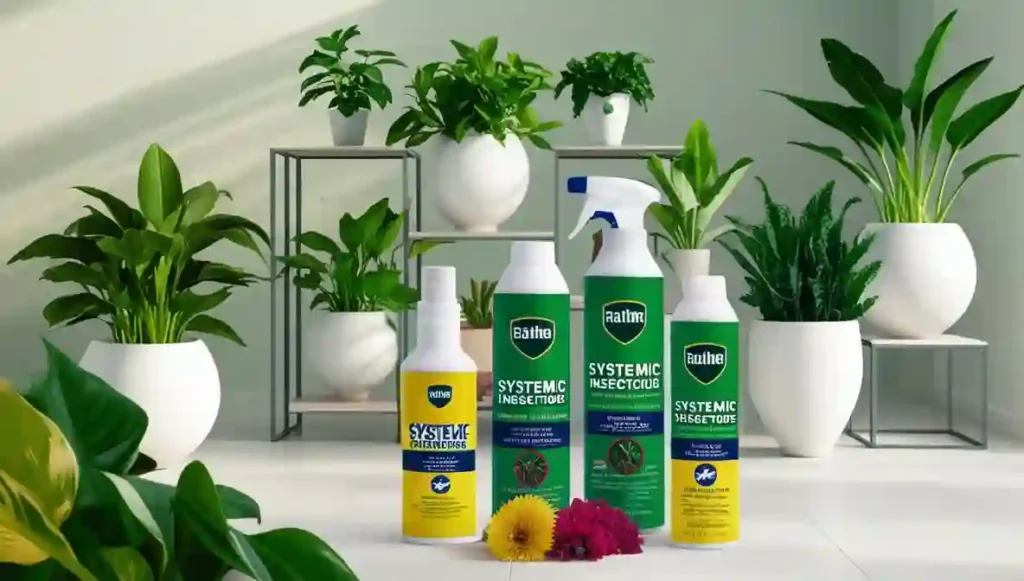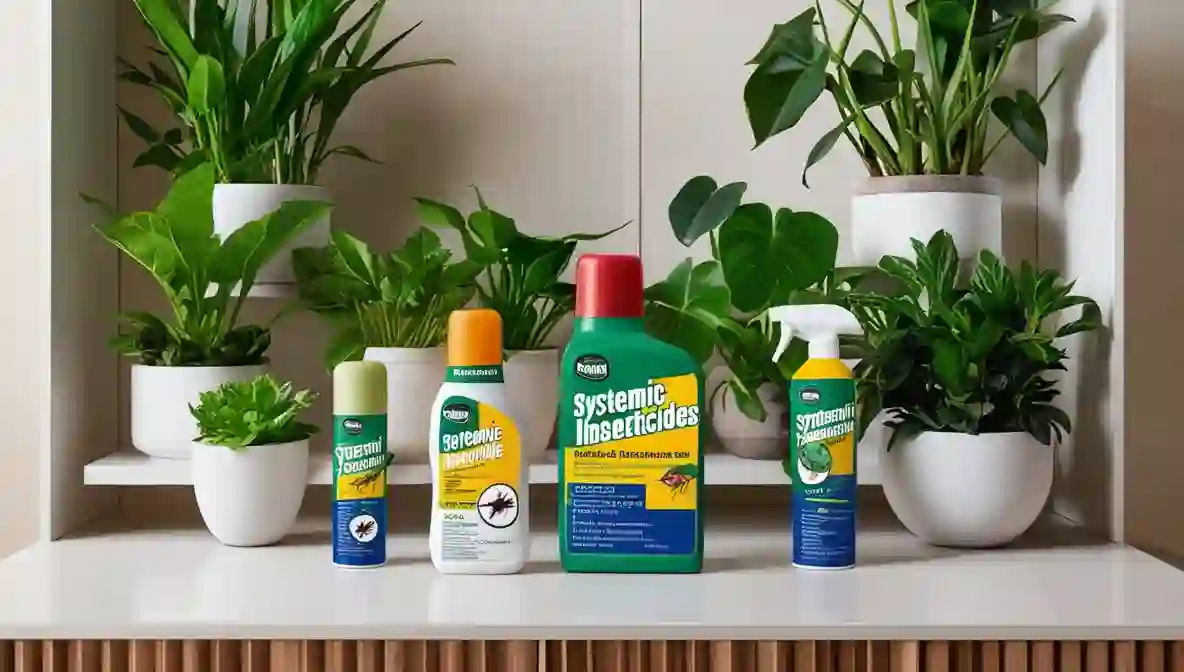Systemic insecticides are a popular choice for controlling pests in indoor plants due to their unique mode of action and effectiveness.
These insecticides are absorbed by the plant and distributed throughout its tissues, providing long-lasting protection against various pests.
Introduction to Indoor Plant Systemic Insecticides
Indoor plants are a great way to bring nature into your living space.
However, they can also become susceptible to various pests and insects that can hinder their growth and overall health.
This is where indoor plant systemic insecticides come into play.
These specialized products are designed to protect your plants from pests by being absorbed into their vascular system and distributed throughout the entire plant, making them an effective long-term solution.
In this section, we will delve deeper into the concept of systemic insecticides and how they work to combat pests.
We’ll also discuss their advantages over other forms of insecticides and highlight some common pests that can be controlled using systemic insecticides.
How do Indoor Plant Systemic Insecticides Work?
Systemic insecticides are formulated with active ingredients that are absorbed by the plant’s roots and transported through its vascular system.

As the insects feed on the plant’s sap or tissues, they ingest the insecticide along with it, leading to their demise.
This method of pest control is highly effective as it targets the insects directly from within the plant, making it difficult for them to develop resistance.
Advantages of Indoor Plant Systemic Insecticides
- Long-lasting Protection: Unlike contact insecticides that may only provide temporary relief, systemic insecticides offer long-lasting protection. Once absorbed by the plant, they continue to work for weeks or even months, providing ongoing defense against pests.
- Targeted Pest Control: Systemic insecticides are highly targeted as they are specifically designed to eliminate pests that attack indoor plants. This ensures that your plants receive protection without harming beneficial insects or the environment.
- Convenience: Using systemic insecticides eliminates the need for frequent applications, saving you time and effort. Once applied, the insecticide is distributed within the plant, providing continuous protection without the need for regular reapplication.
Common Pests Controlled by Indoor Plant Systemic Insecticides
Systemic insecticides are effective against a wide range of pests commonly found in indoor gardens.
Some common pests that can be controlled using these products include:
- Aphids
- Mealybugs
- Scale insects
- Spider mites
- Whiteflies
- Thrips
Types of Indoor Plant Systemic Insecticides
In this section, we will explore different types of indoor plant systemic insecticides available in the market.
Understanding these types will help you make an informed decision when choosing the right product for your indoor plants.
Granular Systemic Insecticides
Granular systemic insecticides are formulated in granule form and are applied to the soil around the base of the plant.
When watered, these granules dissolve and release the active ingredients, which are then absorbed by the plant’s roots.
Granular systemic insecticides are convenient to use and provide long-lasting protection.
Liquid Systemic Insecticides
Liquid systemic insecticides are available in concentrated forms that need to be mixed with water before application.
They can be applied directly to the soil or sprayed onto the foliage of the plant.
The active ingredients in liquid systemic insecticides are quickly absorbed by the plant and distributed throughout its system.
Systemic Insecticide Drenches
Systemic insecticide drenches are concentrated solutions that are mixed with water and poured directly onto the soil around the plant’s root zone.
The drench is absorbed by the roots and transported throughout the plant, providing protection against pests.
This method is particularly effective for larger plants or when dealing with severe infestations.
Factors to Consider When Choosing an Indoor Plant Systemic Insecticide
Choosing the right indoor plant systemic insecticide is crucial for effective pest control without causing harm to your plants or the environment.
Consider these factors when selecting a product:
Targeted Pests
Identify the specific pests infesting your plants before selecting an insecticide. Different systemic insecticides may be more effective against certain pests than others.
Safety Precautions
Read and follow the instructions provided by the manufacturer carefully.
Some systemic insecticides may require protective gear during application or have specific waiting periods before consumption if used on edible plants.
Compatibility with Plants
Ensure that the selected systemic insecticide is compatible with your indoor plants. Some plants may be more sensitive to certain active ingredients than others.
Application Method
Consider your preferred method of application, such as granules, liquid sprays, or drenches, and choose an insecticide accordingly.
Residual Effect
Check whether the product provides long-lasting residual protection or requires frequent reapplication.
Tips for Using Indoor Plant Systemic Insecticides Safely
While indoor plant systemic insecticides are effective tools for pest control, it’s essential to use them safely to protect yourself, your plants, and the environment.
Follow these tips for safe usage:
- Read and follow all instructions provided by the manufacturer.
- Wear appropriate protective gear like gloves and a mask when handling and applying insecticides.
- Keep children and pets away from treated plants until the product has dried or as specified in the instructions.
- Avoid applying systemic insecticides on edible plants unless explicitly labeled for such use.
- Store insecticides in their original containers in a cool, dry place out of reach of children and pets.
- Dispose of empty containers or unused products according to local regulations.
Alternatives to Indoor Plant Systemic Insecticides
While systemic insecticides can be highly effective, some individuals prefer alternative methods for pest control in their indoor gardens.
Here are a few alternatives worth considering:
- Organic Pest Control: Utilize natural methods like neem oil sprays, insecticidal soaps, or beneficial insects like ladybugs or predatory mites to control pests organically.
- Physical Methods: Use physical barriers like sticky traps, mesh covers, or manually removing pests from plants to prevent infestations.
- Cultural Practices: Maintain good plant hygiene by regularly cleaning leaves, avoiding overwatering, and providing adequate airflow to discourage pests from infesting your plants.
- Integrated Pest Management (IPM): Implement a holistic approach that combines multiple pest control methods tailored to your specific needs.
Conclusion
Indoor plant systemic insecticides can be a game-changer when it comes to protecting your indoor garden from pesky pests and promoting healthy plant growth.
By understanding how they work, selecting the right product, and using them safely, you can ensure a thriving indoor garden free from infestations.
Remember to always read and follow the instructions provided by the manufacturer and consider alternative methods if you prefer a more organic approach.
With proper care and attention, your indoor plants will flourish and provide you with joy for years to come!
FAQS
What is a systemic insecticide for indoor plants, and how does it work?
A systemic insecticide is a type of treatment for indoor plants that is absorbed by the plant and circulates throughout its system. It works by making the plant unattractive to insects, ultimately protecting it from pests.
Are systemic insecticides safe for my indoor plants?
When used according to the instructions, systemic insecticides are generally safe for indoor plants. It’s crucial to choose products specifically designed for indoor use and follow the recommended dosage to avoid any harm to your plants.
How often should I apply systemic insecticides to my indoor plants?
The frequency of application depends on the specific product and the severity of the pest problem. Generally, follow the instructions on the insecticide packaging. Some may require monthly applications, while others might be effective for a more extended period.
Can systemic insecticides harm pets or humans?
It’s essential to choose indoor plant systemic insecticides that are labeled as pet and human-friendly. However, it’s advisable to keep pets and children away from treated plants until the insecticide has dried or settled to ensure their safety.
What pests can be controlled with indoor plant systemic insecticides?
Systemic insecticides can effectively control a wide range of pests such as aphids, mealybugs, scale insects, and spider mites. Always check the product label to ensure it targets the specific pests affecting your indoor plants and follow the recommended application guidelines.
I am a Horticulture graduate and passionate gardener with expertise in identifying, growing, and caring for plants, trees, and seeds. With a focus on sustainable practices, they aim to promote environmental awareness and appreciation for the natural world.








